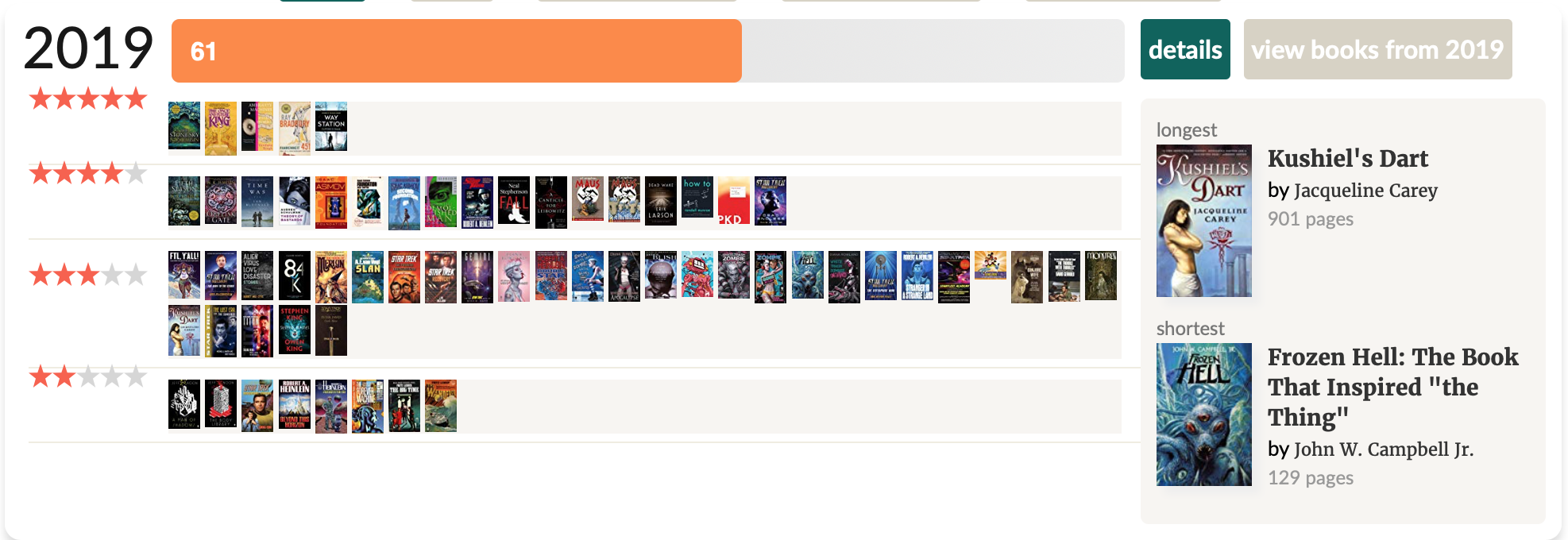Every year, I set myself a goal of reading at least 52 books over the course of the year — an average of one a week. This year I made it to 62. Here’s a (not very) quick overview…

Non-fiction: More than last year, when I just read one, but this still isn’t a category I gravitate towards terribly much — and even when I do, there’s a good chance it’ll be related to geekery or fandom in some way, such as with Star Trek: The Official Guide to the Animated Series, or Randall Munroe’s How To, which is technically non-fiction, but very, very geeky non-fiction. Definitely the best of this year’s non-fiction was Erik Larson’s Dead Wake, a narrative of the sinking of the Lusitania (which I read while on a cruise ship for this year’s vacation, because that just seemed appropriate), but Art Spiegelman’s Maus graphic novel about his father’s experiences in the concentration camps of WWII was a very close second. (I’m also bemused that for someone who’s not really into military or World War stuff, my top non-fiction reads were both World War-related.)
Non-genre-fiction (where “genre” is shorthand — though, not very short, if you include this parenthetical — for science-fiction, fantasy, and horror): Not a single one this year.
Quality genre fiction: Arguably (depending on one’s definition of “quality”, at least) the majority of my reading, in large part because while this is already my general wheelhouse, this year I decided to read my way through all of the Best Novel Hugo Award winners. Over the course of the year I read 21 of the 75 winners (28%), and while many haven’t aged particularly well, and I’ve discovered that I am not a fan of early Heinlein, I’ve been enjoying the journey through classic SF and am looking forward to continuing with the project this year.
Of course, the year kicked off with reading this year’s Philip K. Dick Award nominees, which are always worth reading, even when individual nominees don’t work for me. This year, my personal favorites were Ian McDonald’s Time Was, Audrey Schulman’s Theory of Bastards, and Vandana Singh’s Ambiguity Machines and Other Stories. As usual, my pick for the winner (Ambiguity Machines) didn’t get it, but the actual winner (Theory of Bastards) was well deserved.
Outside of award winners and nominees, I particularly enjoyed Neal Stephenson’s Fall, or: Dodge in Hell…admittedly, not a huge surprise, as I’m a big fan of Stephenson’s work, and he’s currently the one author whose works I’ll pre-order in hardback to ensure I get them as soon as possible every time.
Fluff genre fiction: The rest. As usual, dominated by Star Trek novels, as that’s my “comfort food”, and is always good for a break between choices that, as has been happening with the Hugo winners, are either high-concept brain-stimulating SF, or so dated that they’re painful to read, however well they were received at the time. Outside of Trek, I did particularly enjoy Diana Rowland’s White Trash Zombie series. I found the first four at Goodwill, and then tracked down the last two once I’d made it that far through the series. They’re a fun addition to the zombie zeitgeist, and are worth the read if they catch your eye at all.
Finally, some stats on my year’s reading, according to Goodreads:
- 20,127 pages across 62 books
- Shortest book: John W. Campbell Jr.’s Frozen Hell (129 pages)
- Longest book: Jacqueline Carey’s Kushiel’s Dart (901 pages)
- Most popular: Ray Bradbury’s Fahrenheit 451 (1,674,491 other readers)
- Least popular: Aaron Harvey’s Star Trek: The Official Guide to the Animated Series (13 other readers)
